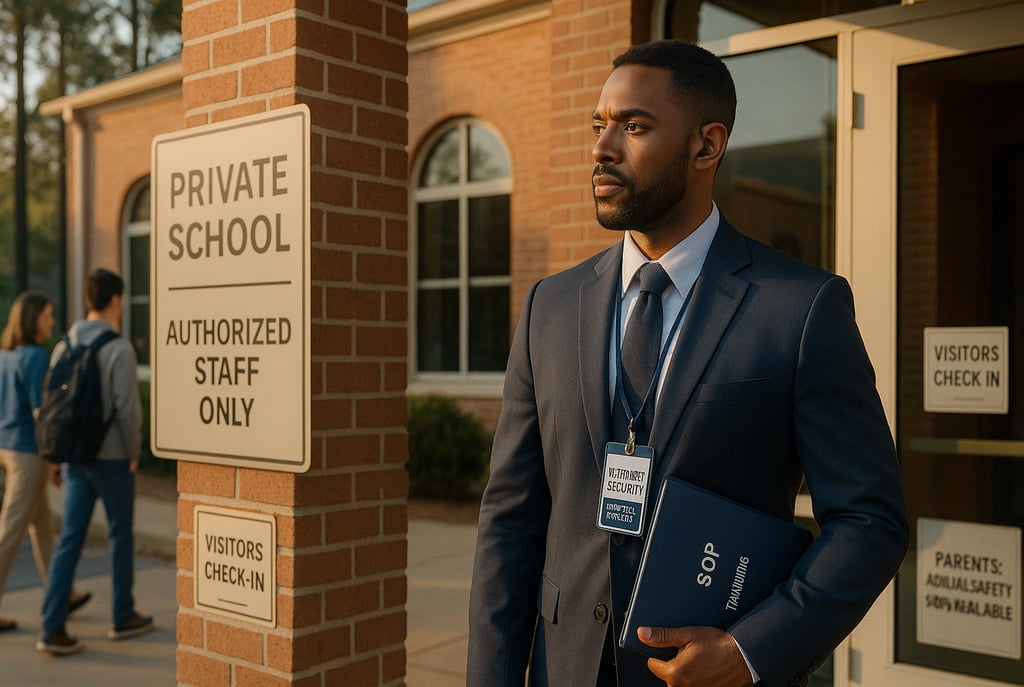North Carolina faith-based school security law
A clear, practical overview of North Carolina’s faith-based school security law (amendments to G.S. 14-269.2) covering who can be authorized, CHP and annual 8-hour training requirements, written SOPs for parents, carry rules for shared worship/school campuses, and step-by-step guidance for compliant implementation.
John Boyette
8/10/20253 min read


North Carolina has enacted new protections that let faith-based nonpublic schools lawfully authorize certain employees and volunteers to carry a weapon on school grounds—under strict conditions. If you serve on a board of trustees, lead a religious school, or help run church-based education programs, here’s what the law changes and how to stay compliant.
What the law does—at a glance
Session Law 2025-81 (House Bill 193) amends G.S. 14-269.2 to create a narrow exception allowing employees or volunteers of a nonpublic school to carry a firearm or stun gun on educational property when they have written authorization from the school’s governing body or its administrative director and meet additional requirements. (North Carolina General Assembly)
The law also clarifies when concealed handguns may be carried on property that is both a school and a place of religious worship, expanding carry within the worship building during specified religious functions while continuing to restrict carry during school operating hours elsewhere on campus. (North Carolina General Assembly)
Important: Nothing here applies to institutions of higher education (UNC system and community colleges) as defined in G.S. 116-143.1. (North Carolina General Assembly)
Who can be authorized (nonpublic K-12 & faith-based schools)
To qualify under the new subdivision of G.S. 14-269.2(g), an employee or volunteer must meet all of the following:
Written authorization from the school board of trustees or school administrative director (terms newly defined in the statute). (North Carolina General Assembly)
Possess a valid North Carolina concealed handgun permit (or a permit recognized under reciprocity). (North Carolina General Assembly)
Complete at least 8 hours of additional firearms coursework annually under the direct supervision of a certified NRA instructor or equivalent, in addition to the CHP training required by law. (North Carolina General Assembly)
The school must adopt written SOPs governing possession/carry on campus and distribute them to parents annually. (North Carolina General Assembly)
The individual must be on the premises of the same nonpublic school where they serve. (North Carolina General Assembly)
Carry at places of worship that share a K-12 campus
For properties that are both a school and a “place of religious worship” (as defined in G.S. 14-54.1—church, chapel, synagogue, temple, meetinghouse, etc.), a person with a valid CHP may:
Carry outside school operating hours anywhere on the educational property; and
Carry at any time inside the worship building while attending worship services, funerals, weddings, christenings, religious fellowships, and similar sacerdotal functions (including walking between the building and the designated parking area).
These allowances remain handgun-only and do not apply if the premises are posted with a conspicuous “no concealed handguns” notice. (North Carolina General Assembly, North Carolina General Assembly)
Practical compliance steps for boards and leaders
Adopt formal SOPs. Spell out who is eligible, your authorization workflow, storage/transport rules, communications, incident reporting, and annual re-authorization timelines. The law requires SOPs and annual distribution to parents. (North Carolina General Assembly)
Document written authorizations. Use a signed letter or resolution from the board of trustees or administrative director referencing G.S. 14-269.2(g). Keep copies with HR/volunteer files. (North Carolina General Assembly)
Verify permits and reciprocity. Confirm an active NC CHP or a permit recognized by reciprocity (NC recognizes all other states’ permits, but holders must follow NC law on where carry is permitted). (North Carolina General Assembly)
Schedule annual training. Ensure each authorized individual completes ≥8 hours every year with a certified NRA instructor (or equivalent), above and beyond CHP training. Keep rosters, curricula, and certificates. (North Carolina General Assembly)
Post signage (if desired). Property owners may prohibit concealed carry by posting conspicuous notices per G.S. 14-415.11(c). Coordinate signage with your SOPs and ministry needs. (North Carolina General Assembly)
Common questions
Does this apply to public schools?
No. The exception concerns nonpublic schools and faith-based properties that meet the statute’s criteria. (North Carolina General Assembly)
What about colleges or private postsecondary schools?
Excluded. The statute cross-references the definition of institutions of higher education in G.S. 116-143.1; H-193’s carry provisions do not extend there. (North Carolina General Assembly)
Can out-of-state permit holders participate?
North Carolina honors any other state’s concealed handgun permit under reciprocity, but the person must still meet all NC requirements and your school’s SOPs. (North Carolina General Assembly)
What if our church-school campus posts “no concealed carry” signs?
Posted notices control. Even where the statute would otherwise allow carry, valid “no concealed handguns” signage removes that permission. (North Carolina General Assembly)
Why this matters for faith communities
The law provides a framework to build a professional, accountable security posture—not a blanket permission slip. Governing bodies must exercise discernment, set standards, and ensure training and documentation are done correctly. When implemented well, the result is a safer, more resilient environment that respects both spiritual openness and legal compliance. (North Carolina General Assembly)
This article is for general education and does not constitute legal advice. Consult counsel for specific applications.
Need help implementing this law the right way?
Protecting Faith North Carolina provides compliance training, SOP development, and state-compliant annual firearms instruction for faith-based schools and places of worship. Let’s build a program that’s lawful, defensible, and mission-aligned.
